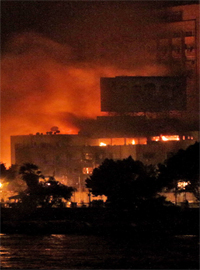| The Arab Spring … In Flames |
 |
|
By Troy Senik
Thursday, November 29 2012 |
“I have come here to seek a new beginning between the United States and Muslims around the world; one based upon mutual interest and mutual respect; and one based upon the truth that America and Islam are not exclusive, and need not be in competition. Instead, they overlap, and share common principles - principles of justice and progress; tolerance and the dignity of all human beings.” – Barack Obama in Cairo, Egypt (June 4, 2009) Two and a half years after Barack Obama’s visit to Cairo, the Egyptian people have grown fatigued with new beginnings. They had one in the early days of 2011, when mobs of protestors assembled in Cairo’s Tahrir Square and called for a revolution ending the presidency-for-life of Hosni Mubarak. Now, less than two years later, Mubarak’s successor has assumed powers so sweeping that he is being referred to in some quarters as a modern-day pharaoh. Last week, Egyptian President Mohammed Morsi declared himself immune from oversight by the nation’s judiciary, allowing him to issue any decrees he sees as necessary to advance the cause of “the revolution” (the moment when one man sees fit to define a revolution is usually the moment that revolution expires). It was not exactly a bolt out of the blue. From the time Morsi assumed the presidency five months ago (a presidency that the Muslim Brotherhood to which he is allegiant claimed it would not pursue), he has employed the quiet persistence of a burgeoning caesar, consolidating his power over the military, the media and the drafters of the nation’s forthcoming constitution. Why the need for such sweeping power grabs? Because the Islamist ideology that Morsi represents can’t brook the democratic fervor that drove the early days of the revolution. A CNN report in the immediate aftermath of Morsi’s victory earlier this year quoted a member of the Brotherhood as saying, "We've been waiting for it for 7,000 years. For the first time in history, we have our own president, elected by us. The power of the people is now in the hands of the president -- and the president has to go and move forward." Notice the subtle distinction in how this power is described in the Egyptian context, as opposed to how it would be articulated in the West. Here, we would say that the limited powers of the presidency were lent to a new president. For Morsi, they are given, with a mandate to discharge some amorphous and undefined “power of the people.” On paper, it may seem semantic. But Morsi’s actions have reinforced the distinction. So too does the Brotherhood’s stated conception of democracy: that it’s worthwhile when it produces Sharia law. In other words, democracy works only when the populace succumbs to what would otherwise be forced upon them. At this point, it behooves us to remember that the Obama Administration assumed a visible role in Egypt’s transition. When the anti-Mubarak protests broke out in early 2010, the president himself publicly called for the embattled leader to step down. Mubarak, for all his defects (and they were legion) had hitherto enjoyed American support on the basis of a cold, but rational calculation: that, given his willingness not to antagonize the United States or Israel, he was the best available option – or, perhaps more accurately, the least bad. Obama, to be sure, cannot be blamed for the overthrow of Mubarak. By the time he rendered judgment on the situation, opposition to Mubarak had already reached an inflection point from which it almost certainly could not return. But his administration is deeply culpable for what has followed. In 2011, just as Mubarak was on his way out the door, National Intelligence Director James Clapper, in testimony on Capitol Hill, described the Muslim Brotherhood as, “[a] largely secular [group], which has eschewed violence and has decried al-Qaida as a perversion of Islam. They have pursued social ends, betterment of the political order in Egypt, etc." As columnist Caroline Glick has pointed out, this is hard to square with the Brotherhood’s slogan, "Allah is our objective; the Prophet is our leader; the Koran is our law; Jihad is our way; dying in the path of Allah is our highest hope." Nor has the Administration shown any instinct for trimming their sails since the Brotherhood has begun to let the mask slip. The White House is currently pushing plans for $1 billion in debt forgiveness for Egypt and spearheading an effort for the International Monetary Fund to loan the country nearly $5 billion. No serious demands on Cairo have been made as a condition of that financing. Indeed, Egypt’s recent role in brokering a cease-fire in Gaza has actually earned Morsi praise in some corners of the Beltway, despite the fact that those with a sufficiently jaundiced eye widely interpret it as a fig leaf intended to diminish criticism of the new authoritarianism on the Nile. It would be gratifying, though not exonerating, to say that the Obama Administration simply misread the situation in Egypt. But that conclusion can’t be justified. The Muslim Brotherhood has always been – and continues to be – explicit about its goal of imposing sharia law and renewing hostilities with Israel. The only explanation is willful blindness – the same blindness it should be noted, that caused the White House to ignore Iranian protestors in 2009 or declare Syria’s murderous dictator, Bashar al-Assad, a “reformer.” Early in his presidency, Barack Obama asked to be judged on results. Fair enough. He went to Cairo two and a half years ago speaking of justice, progress, tolerance and human dignity. As a result of his administration’s policies, Egypt now has less of each. |
Related Articles : |
























